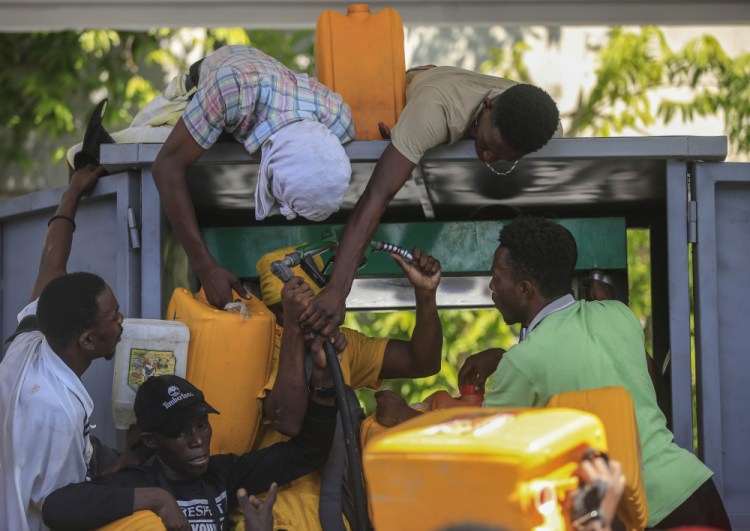PORT-AU-PRINCE, Haiti — The U.S. government is urging U.S. citizens to leave Haiti because of the country’s deepening insecurity and a severe lack of fuel that has affected hospitals, schools and banks. Gas stations remained closed on Thursday.
The rare warning from the U.S. State Department comes as Haiti’s government and police are struggling to control gangs that have blocked fuel distribution terminals for several weeks.
“Widespread fuel shortages may limit essential services in an emergency, including access to banks, money transfers, urgent medical care, internet and telecommunications, and public and private transportation options,” the State Department warned on Wednesday. “The U.S. Embassy is unlikely to be able to assist U.S. citizens in Haiti with departure if commercial options become unavailable.”
It’s unclear how many U.S. citizens currently live in Haiti. A State Department official told The Associated Press that it does not provide those statistics and U.S. citizens are not required to register their travel to a foreign country.

Police officers attempt to control a crowd gathered at a gas station hoping to fill their tanks, in Port-au-Prince, Haiti, Thursday, Nov. 4. AP Photo/Odelyn Joseph
On Tuesday, top Haitian government officials acknowledged the widespread lack of fuel during a news conference and said they were working to resolve the situation, although they provided no details.
Defense Minister Enold Joseph said the government is investigating why 30 fuel tanks sent to Haiti’s southern region went missing, adding that he has observed gasoline being sold on the black market.
In addition, Le Nouvelliste newspaper recently reported that truck drivers have been kidnapped and fuel trucks hijacked.
The fuel shortage also has threatened Haiti’s water supply, which depends on generators.
On Wednesday, Doctors Without Borders warned that the shortages have forced it to reduce medical care since last week, with staff treating only patients with life-threatening conditions. The aid group said that its hospital and emergency center will run out of fuel for generators in three weeks or less if new supplies don’t arrive.
“As tensions and armed conflict escalate in Haiti’s capital, shortages of fuel, public transportation and drinking water are putting medical facilities and patients at risk,” the aid group said. “Nearly all public and private health facilities in Port-au-Prince have stopped or limited admissions to only acute cases or closed their doors due to similar problems.”
The aid group said that one patient with respiratory distress was recently refused at four different medical centers because the lack of fuel forced them to halt admissions. A fifth facility took her in, officials said.
Doctors Without Borders also said that the lack of fuel is preventing staff from reaching the hospital because of the scarcity of public transportation. It’s a problem seen elsewhere, with parents unable to send their children to school and some employees unable to go to work.
The situation also has led to a spike in food prices in a country of more than 11 million people where more than 60% of the population makes less than $2 a day. Meanwhile, a gallon of gasoline, when available, currently costs $15.
___
Associated Press writer Dánica Coto in San Juan, Puerto Rico, contributed to this report.
Send questions/comments to the editors.



Success. Please wait for the page to reload. If the page does not reload within 5 seconds, please refresh the page.
Enter your email and password to access comments.
Hi, to comment on stories you must . This profile is in addition to your subscription and website login.
Already have a commenting profile? .
Invalid username/password.
Please check your email to confirm and complete your registration.
Only subscribers are eligible to post comments. Please subscribe or login first for digital access. Here’s why.
Use the form below to reset your password. When you've submitted your account email, we will send an email with a reset code.